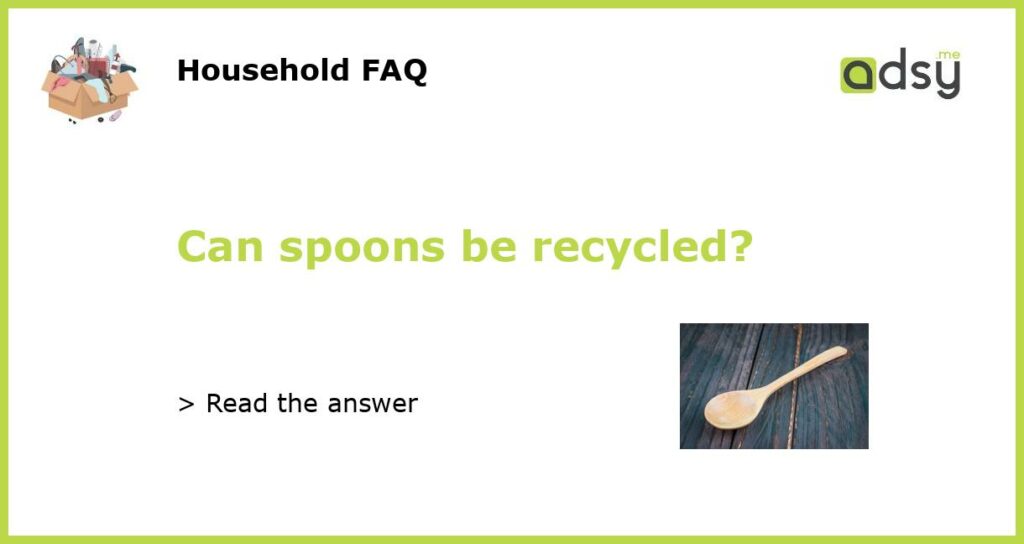Yes, spoons can be recycled!
Recycling is an essential step towards reducing waste and protecting the environment. Many people are familiar with recycling paper, plastic, and glass, but not everyone knows that even small items like spoons can also be recycled. In fact, recycling spoons not only helps to conserve resources but also saves energy and reduces pollution. In this article, we will explore the recycling process for spoons, the benefits of spoon recycling, and how you can properly recycle your spoons.
The recycling process for spoons
The process of recycling spoons typically involves several steps to transform the used spoons into raw materials that can be used to manufacture new products. Here is a general outline of the spoon recycling process:
- Collection: Spoons can be collected through various channels, including curbside recycling programs, drop-off locations, or recycling centers.
- Sorting: Once collected, the spoons are sorted to separate them from other materials. This is usually done using machinery or manual sorting.
- Cleaning: After sorting, the spoons are thoroughly cleaned to remove any food residue or contaminants. This step is crucial to ensure the quality of the recycled material.
- Shredding/Melting: Depending on the type of material, the spoons may be shredded or melted down to form small pellets or molten metal. This step helps to reduce the spoons to a more manageable form for further processing.
- Reformation: The shredded or melted spoons are then reformed into new products, such as cutlery, kitchenware, or other metal items. This may involve additional processes like casting, molding, or shaping.
The benefits of spoon recycling
Spoon recycling offers numerous benefits for both the environment and society as a whole. Here are some key advantages of recycling spoons:
- Resource conservation: By recycling spoons, valuable resources like metal can be recovered and reused, reducing the need for virgin materials. This helps to conserve natural resources and reduce the environmental impact of extraction and manufacturing processes.
- Energy savings: Recycling requires less energy compared to producing new materials from raw resources. Recycling spoons can help to save energy and reduce greenhouse gas emissions associated with manufacturing.
- Waste reduction: Recycling spoons helps to divert them from landfills, where they would take up space and contribute to environmental pollution. By recycling, we can reduce the amount of waste that ends up in landfills and promote a more sustainable waste management system.
- Economic benefits: Recycling can create new job opportunities and contribute to local economies. It stimulates the recycling industry and supports businesses involved in the collection, sorting, and processing of recyclable materials.
- Environmental protection: Recycling spoons and other items helps to protect the environment by reducing the demand for new materials, conserving resources, and minimizing pollution associated with extraction and manufacturing.
How to properly recycle spoons
If you want to recycle your spoons, here are some steps to follow:
- Check local recycling guidelines: Different areas may have different recycling guidelines and acceptance policies. Check with your local recycling facility or municipality to find out if spoons are accepted for recycling.
- Clean and separate: Clean the spoons thoroughly to remove any food residue or contaminants. Separate them from other materials like paper or plastic, as this makes the sorting process easier.
- Recycling options: Find out the available recycling options in your area. This may include curbside recycling, drop-off locations, or recycling centers. Determine the most convenient option for you.
- Follow instructions: Follow any specific instructions provided by the recycling facility or municipality. This may include packaging the spoons in a specific way, placing them in designated bins, or adhering to certain requirements.
- Spread the word: Encourage others to recycle their spoons and educate them about the benefits of recycling. By spreading awareness, you can help to promote sustainable practices and contribute to a greener future.
In conclusion
Yes, spoons can be recycled! Recycling spoons is a simple yet impactful way to reduce waste, conserve resources, and protect the environment. By understanding the recycling process for spoons, the benefits of spoon recycling, and how to properly recycle spoons, we can all play a part in creating a more sustainable future. So, next time you have a spoon to dispose of, consider recycling it rather than throwing it away!






